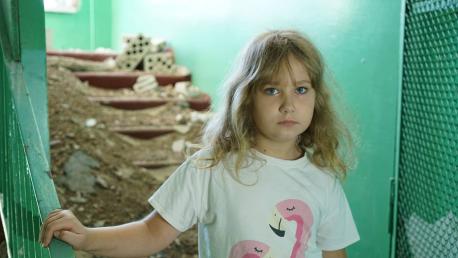
UNICEF in Europe
UNICEF's work in Europe and in neighboring Central and Western Asia focuses on meeting the urgent needs of vulnerable and marginalized children — including children impacted by the war in Ukraine and other child refugees.
How to help children in Europe
UNICEF's mission in Europe continues to evolve to reflect new crises and increasing humanitarian needs in Ukraine and other countries.
Many countries in Europe are still recovering from the effects of the COVID-19 pandemic, which overburdened health systems to the point of near collapse. Many students lost access to schooling and families suffered financial and psychological strain. Before COVID-19, nearly one quarter of children in Europe lived in poverty, were socially excluded or otherwise marginalized.
And even before the 2022 escalation of war in Ukraine sent millions of children and women fleeing into neighboring European countries, there was a large refugee and migrant population on the continent. Southeast Europe remains a major transit route for children and families on the move.
UNICEF is leveraging its long-standing presence in Europe to meet the needs of the most vulnerable children, helping them access health care, education and other critical services.
A destination for refugee and migrant children and families
At every stage of their journey, UNICEF supports uprooted children, urging governments to protect their rights as well as those from other ethnic and vulnerable groups who may miss out on vital services like immunizations.
High national averages showing immunization coverage throughout Europe can mask disparities, with refugee and migrant children often missing out. UNICEF works to preserve that right and help ensure that every child has the chance to live in a nurturing environment. UNICEF also works to keep families together whenever possible and prevent the placement of children in institutional care.
Support UNICEF's mission. Donate today.
Explore UNICEF’s work in Europe
UNICEF's work in Europe and in neighboring Central and Western Asia focuses on meeting the urgent needs of vulnerable and marginalized children including children impacted by the war in Ukraine and other child refugees. Partnerships and programs aim to address a range of issues, including poor health care, inadequate nutrition, school dropout, violence against children, and child exploitation and abuse.
UNICEF implements programs for children through country offices in Albania, Armenia, Azerbaijan, Belarus, Bosnia and Herzegovina, Bulgaria, Croatia, Georgia, Greece, Kosovo, Moldova, Montenegro, North Macedonia, Romania, Serbia and Ukraine in Europe, and in neighboring countries in Central Asia, including Kazakhstan, Kyrgyzstan, Tajikistan, Turkmenistan and Uzbekistan.
UNICEF in Greece
When UNICEF established operations in Greece in 2020, years of austerity measures and government spending cuts had left their mark on the nation’s most vulnerable. Poverty posed significant risks for children, including refugee and migrant children, children from minority groups, those who live with disabilities and children who are forced to grow up in institutions.
Since ramping up operations, UNICEF has been partnering with the government and European Economic Union to develop strategies to reduce child poverty and safeguard the lives and futures of all children living in Greece.
UNICEF has been promoting inclusive education and early learning for children with disabilities, child protection and community-based care and fostering for children growing up on their own.
Many public systems have been strained by years of migration. UNICEF has partnered with the Ministry of Education to ensure that refugee and migrant children get their fair chance to learn and every student is supported.
As part of the UNICEF Child Friendly Cities Initiative, UNICEF is also working closely with a network of cities in Europe to enhance the role of youth in decision making on issues that affect them and otherwise improve children's lives.
UNICEF in Ukraine
Violence, insecurity and deprivation has been a way of life for children and families living in Donetsk and Luhansk, in eastern Ukraine, since March 2014, when conflict first erupted in the region, and civilian neighborhoods first came under attack. UNICEF deployed emergency response teams to deliver humanitarian relief to those living near the 'contact line' separating government-controlled areas from conflict zones.
When the war in Ukraine escalated on Feb. 24, 2022 — triggering a much bigger child protection crisis — UNICEF's emergency response was immediately expanded. Leveraging existing partnerships and its longstanding presence in the country, UNICEF rapidly scaled up emergency relief measures for children and families impacted by the war, delivering safe water, medical supplies, mental health support and more to those who remained inside Ukraine and to refugees fleeing to neighboring countries.